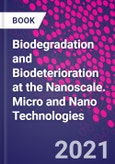Biodegradation and Biodeterioration at the Nanoscale describes the biodegradation and biodeterioration of materials in the presence of nanomaterials. The book's chapters focus on the basic principles, action mechanisms and promising applications of advanced nanomaterials, along with their integration with biotechnological processes for controlled degradation and deterioration of materials. In addition, the current research indications, positive or negative environmental impacts, legislation and future directions are also discussed. This book is an important reference source for researchers, engineers and scientists working in environmental remediation, biotechnology, materials science, corrosion and nanotechnology.
Please Note: This is an On Demand product, delivery may take up to 11 working days after payment has been received.
Table of Contents
PART 1: BASIC PRINCIPLES
1. Biodegradation and biodeterioration at the nanoscale: an introduction
2. Nanoscale characterization of biodegradation
3. Standard methods for evaluation of biodegradation
4. Roles of bacteria, fungi, algae, and enzymes in biodegradation
5. Roles of nanoparticles in biodegradation
6. Roles of biofilms in the corrosion of metals
7. Enzyme-encapsulated nanoparticles for the biodegradation of materials
8. Enzyme-coupled nanomembranes for the biodegradation of materials
PART 2: BIODEGRADATION OF ORGANIC MATERIALS AT THE NANOSCALE
9. Effects of nanoparticles on the biodegradation of organic materials
10. Biodegradation of plastic-based waste materials
11. Biodegradation of rubber-based waste materials
12. Biodegradation of lawn clippings-based waste materials
13. Biodegradation of timber industry-based waste materials
PART 3:� BIODETERIORATION OF METALLIC MATERIALS AT THE NANOSCALE
14. Microbial-induced corrosion: an introduction
15. Effects of nanomaterials on microbial-induced corrosion of metals
16. Microbial-induced corrosion of titanium nanoalloys
17. Microbial-induced corrosion of aluminum nanoalloys
18. Microbial-induced corrosion of copper nanoalloys
19. Microbial-induced corrosion of braze nanoalloys
20. Methods for mitigation of microbial-induced corrosion
PART 4: BIODETERIORATION OF MINERAL MATERIALS AT THE NANOSCALE
21. Biodeterioration of mineral materials by microorganisms
22. Microbiologically induced deterioration of concrete
23. Microbiologically induced deterioration of nanoconcretes
24. Microbiologically induced deterioration of cement-based materials
PART 5: ENVIRONMENTAL IMPACTS AND FUTURE SCOPES
25. Ecotoxicological impacts and socio-economical aspects of biodegradable materials
26. Ecotoxicological impacts and socio-economical aspects of biocorrosion
27. Current challenges, research gaps, and measures
28. Enforcement, legislation, and future perspectives








